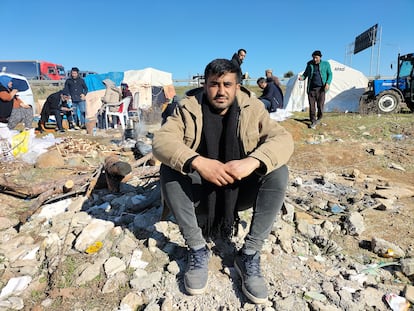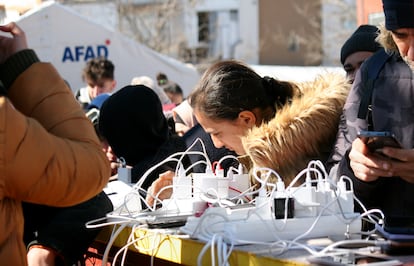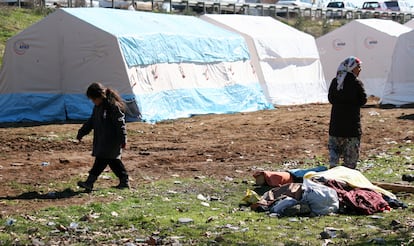Islahiye, a city devastated by the earthquake: ‘We spend our days feeling thankful for being alive’
The quake has turned this Turkish town of 60,000 into a mix of damaged buildings, makeshift tents, aid trucks and groups of survivors huddled around bonfires


From up above, satellite images of the Turkish city of Islahiye, population 60,000, show what looks like an intermittent jigsaw puzzle of houses and rubble. Down on the ground, it is more like an obstacle course featuring destroyed buildings, tents for survivors, groups of people huddled around improvised bonfires, debris removal machines and trucks delivering water, food and blankets. If the police were to also cordon off all the buildings that have lost their façade – which creates a strange feeling of privacy laid bare – or are tilting sideways in a threatening way, it would not be possible to advance more than a few meters.
“Half of Islahiye has disappeared,” said Fatma Sahin, the metropolitan mayor of Gaziantep, in a trembling voice on Tuesday. Gaziantep is one of the provinces hardest hit by the deadliest earthquake in the area in almost a century, with more than 20,000 deaths reported so far in Turkey and Syria.
Furkan Koyuncu, 23, only has three possessions left from before the earthquake: the shirt, pants and underwear he was wearing. “Everything else is from AFAD [the government’s emergency management agency],” he says, standing in a lot while his family makes tea with the fire they made by lighting some planks.
"The shoes are also yours, aren't they?"
― No, these were also given to me. I ran out barefoot. The earthquake woke me up. It was at night, I was sleeping. I grabbed the family and we jumped from the second floor. It’s not very high, so we didn’t hurt ourselves. About 20 seconds later, the house fell down.
Now, he says, the worst thing is not the cold they feel at night, sleeping in subzero temperatures inside a tent that his family has set up with fabrics found on the street because, he explains, the 17 members did not fit into the one provided by the authorities. The worst thing, he asserts, is that they only have one cellphone to find out how the rest of their relatives are faring, those who ended up in a camp for quake victims. “All the other phones are under the rubble. I thought about going in to look for them, but I don’t think they’ll let me or that they even work anymore,” he adds. So now what? “We don’t have any money, so we are forced to stay here,” he replies resignedly.

Natural disasters like this one give a twist to the concept of priority. In Islahiye, which was already a humble place to begin with, there is no lack of food or drink. Official organizations, non-profits (including several Muslim solidarity groups) and volunteers can be seen frequently distributing food such as hot lentil soup, bread, sweets and fruit. Bottles of water and fruit juices are also easy to come by, and diapers and basic medicines are being distributed.
More help arrives suddenly. An NGO from Balochistan begins to hand out unwrapped rag dolls to mothers and children, and five men start distributing clothes from a van to whoever raises their hand first, in a kind of free auction. “Thank God, they are giving us everything. Thanks to the State, thanks to all those who send us help, may God repay them a thousand times over. We have all our needs covered, I’m not lying,” says an elderly man named Güllü, who has been rehoused in a tent.
What is not included in that “everything” is everything else: running water, electricity, gas, pharmacies or a concrete roof. The phone signal comes and goes.
Sleeping in cars
“There are aftershocks all the time and that scares us. We sleep in the cars because we don’t dare to go home,” says Arel Yildirim, 21. The “home” he is talking about is not really a house: his family’s home was seriously damaged, and he is referring to the security booth of his father’s business, where they are staying temporarily and where some relatives have brought them clothes and food.
For Yildirim, after the initial shock of having escaped death, the days now seem long. “We spend them sitting around, thankful to be alive. We try to find food and eat something, and to help those around us (...) We can’t do anything. We think about the dead and how we have survived. We try to calm each other down. And we think about this burden that God has placed on us,” she says while standing in line with a friend of the same age, Havanur Hamzaoglu, to recharge their cellphones at collective sockets powered by an electric generator on the street. Although the battery will be full again shortly, Arel does not feel like spending much time online. “The news is terrible all the time.”

Mirroring Yildirim’s fears, very few people in Islahiye are risking staying under a roof that could become lethal in an aftershock, explains Gorkem Sengul, a 24-year-old volunteer from the Turkish city of Izmit (which suffered an earthquake in 1999). Most sleep in tents, in their car or directly in the street, where groups of people can be seen warming themselves in front of a bonfire or idling away the hours. Two camps with 3,500 tents have been set up in the area.
Onder Kiziltas, a 24-year-old volunteer, ranks the needs. The first thing are the toilets, he says, showing a picture of a squat toilet (common in this region) clogged and overflowing with dirty water. The second most pressing issue is finding generators, “especially for those who do not have a tent and are on the street.” He also points to the problem of diesel, which is preventing some people from leaving with their families to another part of the country. “You have to travel many kilometers to get to a gas station that has it,” he explains. At the one that connects Islahiye with the city of Sanliurfa, some cracks have been formed by the earthquake.
There is also a Kurdish population living in this area. Reving Sagvan, a doctor sent over by the Ministry of Health of the Autonomous Goverment of Iraqi Kurdistan, points out that in addition to the usual problems in these cases, such as hypothermia, respiratory tract infections or dehydration, some patients with chronic problems are no longer able to take their medication: they left it at home when they ran out and can no longer get it back.

The earthquake has exacerbated the situation faced by Syrian refugees from the civil war. Turkey, the country that hosts the largest number (3.7 million), has gone from treating them as “brothers” and “guests”– as President, Recep Tayyip Erdogan used to describe them – to having returned more than 500,000 since 2016 and wanting to repatriate a million more with a volunteer return plan that has been criticized by human rights groups.
Nura Taha, who is Syrian, does not bite her tongue – and soon pays the price. She says that she was only placed in a tent after spending a night in the open, after the Turkish population had already received them, and that she was treated with indifference when she asked for one because, even though she speaks Turkish, the locals can tell by her clothing where she is from. “The earthquake has not distinguished between Turks and Arabs, but they always discriminate against us. Every time there are problems, they blame us for it. The situation was already very difficult and now more so,” she says. But the alternative, she admits, is worse: returning to her home province, Idlib, which is controlled by Hayat Tahrir Al Sham jihadists, and “die because they see me smoking a cigarette.”
As she is complaining, a Turkish man who understands Arabic steps in to accuse her of tarnishing the image of a country that she should be “thankful to” for giving her food and water just like Turkish survivors are receiving. Shortly afterwards, a service worker comes over to deliver diapers, clothes and candy.
Sign up for our weekly newsletter to get more English-language news coverage from EL PAÍS USA Edition
Tu suscripción se está usando en otro dispositivo
¿Quieres añadir otro usuario a tu suscripción?
Si continúas leyendo en este dispositivo, no se podrá leer en el otro.
FlechaTu suscripción se está usando en otro dispositivo y solo puedes acceder a EL PAÍS desde un dispositivo a la vez.
Si quieres compartir tu cuenta, cambia tu suscripción a la modalidad Premium, así podrás añadir otro usuario. Cada uno accederá con su propia cuenta de email, lo que os permitirá personalizar vuestra experiencia en EL PAÍS.
¿Tienes una suscripción de empresa? Accede aquí para contratar más cuentas.
En el caso de no saber quién está usando tu cuenta, te recomendamos cambiar tu contraseña aquí.
Si decides continuar compartiendo tu cuenta, este mensaje se mostrará en tu dispositivo y en el de la otra persona que está usando tu cuenta de forma indefinida, afectando a tu experiencia de lectura. Puedes consultar aquí los términos y condiciones de la suscripción digital.








































